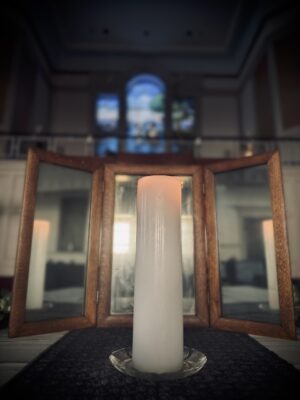When the Door Doesn’t Budge
By Rev. Sterling Severns, Pastor
Life has a way of surprising us with change. One day everything feels familiar, and the next we’re in territory that’s suddenly unrecognizable. It might be a diagnosis we never expected, the loss of a job we thought was secure, or a shift in a relationship we counted on. Or it might be more subtle—realizing that something which once made perfect sense no longer feels like it fits. Moments like these can freeze us in place. We don’t know how to move forward, and we can’t go back. So we wait. And wonder. And wrestle with the weight of it all.
In my own experience, there have been more than a few seasons like this—times when the path ahead felt uncertain, and the world around me felt both familiar and foreign. Everything on the outside may have looked the same, but something inside had shifted. And without exception, each time, it’s taken its toll. The waiting. The weariness. The wondering if anything is actually changing at all. There’s a deep vulnerability in those moments, especially when we’ve asked God for help, when we’ve prayed for direction, healing, peace. We show up to our lives the best we can. Still trying. Still hoping. Still doing our thing. But the silence lingers, and the door we’ve been knocking on stays shut.
The longer we walk in faith, the more we come to see the real change comes not when the door swings open, but when something inside us opens instead. Not suddenly, not dramatically, but slowly, quietly, over time. God doesn’t always remove the stuckness, but God meets us in it, reshaping our hearts, softening the places that have grown hard with fear or frustration. Sometimes, when the exhaustion finally gives way to surrender, we discover that the door was never locked after all. We were just too weary to see how close we already were to grace. We lean against it for support, and somehow, we find ourselves on the other side.
God doesn’t wait for us beyond the threshold. God is with us in the hallway, in the waiting, in the ache. In the quiet work of transformation that begins long before the breakthrough. That is the mystery and mercy of the God who answers, not always by changing our circumstances, but by being unshakably present within them.
So wherever you find yourself this week, whether you’re waiting for the door to open, or wondering if it ever will, may you know you are not alone. May you be reminded that presence itself is a gift, that transformation often begins before we even recognize it, and that grace has a way of meeting us right where we are.


